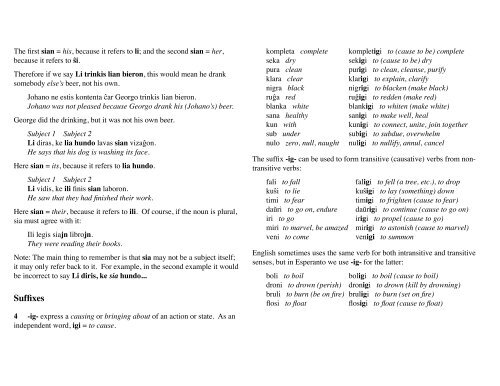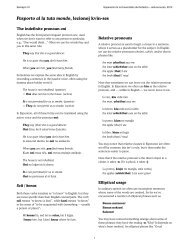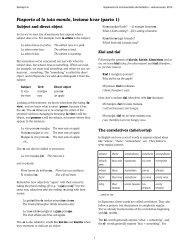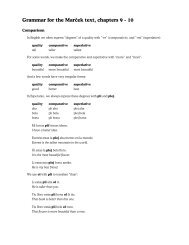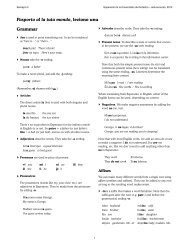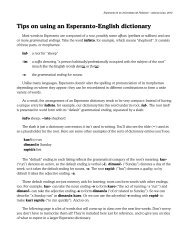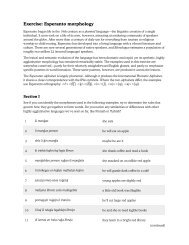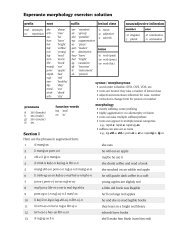The alphabet and pronunciation - Lodestone
The alphabet and pronunciation - Lodestone
The alphabet and pronunciation - Lodestone
- No tags were found...
You also want an ePaper? Increase the reach of your titles
YUMPU automatically turns print PDFs into web optimized ePapers that Google loves.
<strong>The</strong> first sian = his, because it refers to li; <strong>and</strong> the second sian = her,because it refers to !i.<strong>The</strong>refore if we say Li trinkis lian bieron, this would mean he dranksomebody else’s beer, not his own.! Johano ne estis kontenta "ar Georgo trinkis lian bieron.! Johano was not pleased because Georgo drank his (Johano’s) beer.George did the drinking, but it was not his own beer.! Subject 1 Subject 2! Li diras, ke lia hundo lavas sian viza#on.! He says that his dog is washing its face.Here sian = its, because it refers to lia hundo.! Subject 1 Subject 2! Li vidis, ke ili finis sian laboron.! He saw that they had finished their work.Here sian = their, because it refers to ili. Of course, if the noun is plural,sia must agree with it:! Ili legis siajn librojn.! <strong>The</strong>y were reading their books.Note: <strong>The</strong> main thing to remember is that sia may not be a subject itself;it may only refer back to it. For example, in the second example it wouldbe incorrect to say Li diris, ke sia hundo...Suffixes4" -ig- express a causing or bringing about of an action or state. As anindependent word, igi = to cause.! kompleta complete! kompletigi to (cause to be) complete! seka dry! sekigi to (cause to be) dry" pura clean! purigi to clean, cleanse, purify! klara clear! klarigi to explain, clarify! nigra black! nigrigi to blacken (make black)! ru#a red! ru#igi to redden (make red)" blanka white! blankigi to whiten (make white)! sana healthy! sanigi to make well, heal! kun with! kunigi to connect, unite, join together! sub under! subigi to subdue, overwhelm! nulo zero, null, naught! nuligi to nullify, annul, cancel<strong>The</strong> suffix -ig- can be used to form transitive (causative) verbs from nontransitiveverbs:! fali to fall! faligi to fell (a tree, etc.), to drop! ku$i to lie! ku$igi to lay (something) down! timi to fear! timigi to frighten (cause to fear)! da%ri to go on, endure! da%rigi to continue (cause to go on)! iri to go! irigi to propel (cause to go)! miri to marvel, be amazed! mirigi to astonish (cause to marvel)! veni to come! venigi to summonEnglish sometimes uses the same verb for both intransitive <strong>and</strong> transitivesenses, but in Esperanto we use -ig- for the latter:! boli to boil! boligi to boil (cause to boil)! droni to drown (perish)! dronigi to drown (kill by drowning)! bruli to burn (be on fire)! bruligi to burn (set on fire)! flosi to float! flosigi to float (cause to float)


